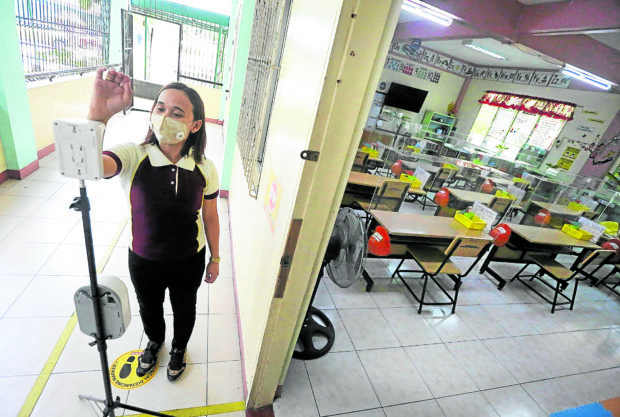NEDA pushes in-person classes on top of alert level 1 to hasten economic recovery

FILE PHOTO: On October 19, 2021, a grade school teacher of Aurora Quezon Elementary school in Manila demonstrate what a face-to-face class would look like amid the COVID-19 pandemic, with plastic barriers separating each armchair from one another and teachers wearing PPE during class. – Socioeconomic Planning Secretary Karl Kendrick Chua is pushing for the resumption of in-person classes as Metro Manila and 38 other areas ease to COVID-19 Alert Level 1 from March 1-15, 2022. INQUIRER/MARIANNE BERMUDEZ
MANILA, Philippines — COVID-19 Alert level 1 restrictions implemented since Tuesday, March 1, will benefit more than three-fifths of the economy and restore millions of jobs stopped by the pandemic, but the country’s chief economist said much more economic output would be regained once face-to-face classes are in full swing.
Socioeconomic Planning Secretary Karl Kendrick Chua told a Palace press briefing Tuesday that the lowest and least stringent alert level currently in place in Metro Manila and 38 other areas covered 62 percent of the economy, where 48 percent of the country’s workforce or 20.3 million would benefit from eased restrictions.
The rest of the country under alert level 2 accounted for 38 percent of gross domestic product (GDP) but had the bigger 52-percent share of workers nationwide, equivalent to 21.7 million Filipinos, said Chua, who heads the state planning agency National Economic and Development Authority (Neda).
Citing Neda estimates, Chua said areas under alert level 1 will add P9.4 billion in gross value-added or output per week, of which P3 billion will be salaries earned by workers. As such, Chua said there will be an estimated 170,000 fewer jobless Filipinos over the next quarter.
Chua said that if the entire Philippines moved to the lowest alert level, a bigger P16.5 billion in economic activity a week, of which P5.2-billion worth would be workers’ pay, will likely slash unemployment by a larger 297,000 in the next three months.
“We hope that next week, the entire country will be under alert level 1. We can do that if we cooperate and follow the minimum health standards,” Chua said.
READ: World Bank, Neda back full opening of classes
The Neda chief said tourism will benefit the most from the lower alert level — P750 billion, or half of the P1.5 trillion shed by the sector in 2020 at the height of the most stringent COVID-19 lockdowns, were expected to be recovered as transportation, hotels, malls and restaurants could increase their capacity to 70-100 percent from 40-85 percent under alert level 2.
But Chua said resuming face-to-face schooling would have a bigger contribution to the Philippines’ economic recovery.
Chua noted that only 13.1 percent or 7,939 schools out of a total of 60,473 in the country were already conducting in-person classes or ready for face-to-face instruction, citing the latest Department of Education (DepEd) data as of Feb. 22.
“As children get vaccinated, this is the opportunity to open more schools for face-to-face learning, so that we can boost the economy and improve the learning opportunity of children,” Chua said.
Chua said an additional P12 billion weekly would be added to the economy when services around schools like transport, dorms, food stalls, and school materials also resume operations.
With two years of only distance learning – through modules or online – in the Philippines, an estimated P22 trillion or P11 trillion per year in long-term productivity losses among students who were unable to learn well would be inflicted into the economy, Chua said, citing Neda’s estimates on the pandemic’s scarring effects last year.
As face-to-face classes were more effective, school children’s learning outcomes would also improve by about 50 percent, Chua added.
“One-fourth of parents actually stay home, like myself, to help younger children go through modular or online schooling. [Resuming face-to-face classes] will help,” Chua said, adding that the shift to COVID-19 Alert Level 1 will have a limited impact on jobs if adults still had to stay at home to help their kids study.
“If we want a full recovery, then alert level 1 is not enough. Face-to-face learning must also resume, because 40 percent of our population are in the school-age, so that is a big contributor to the economy,” Chua said.
Last Monday night, Chua told President Rodrigo Duterte that the Philippine economy shed P3.8 trillion in output losses during the past two years amid the prolonged COVID-19 pandemic.
RELATED STORIES
Gov’t eyes to give Filipinos bigger responsibility to keep themselves COVID-free
Neda chief pushes new metrics, mindset: Treat COVID as ‘endemic’
For more news about the novel coronavirus click here.
What you need to know about Coronavirus.
For more information on COVID-19, call the DOH Hotline: (02) 86517800 local 1149/1150.
The Inquirer Foundation supports our healthcare frontliners and is still accepting cash donations to be deposited at Banco de Oro (BDO) current account #007960018860 or donate through PayMaya using this link.
